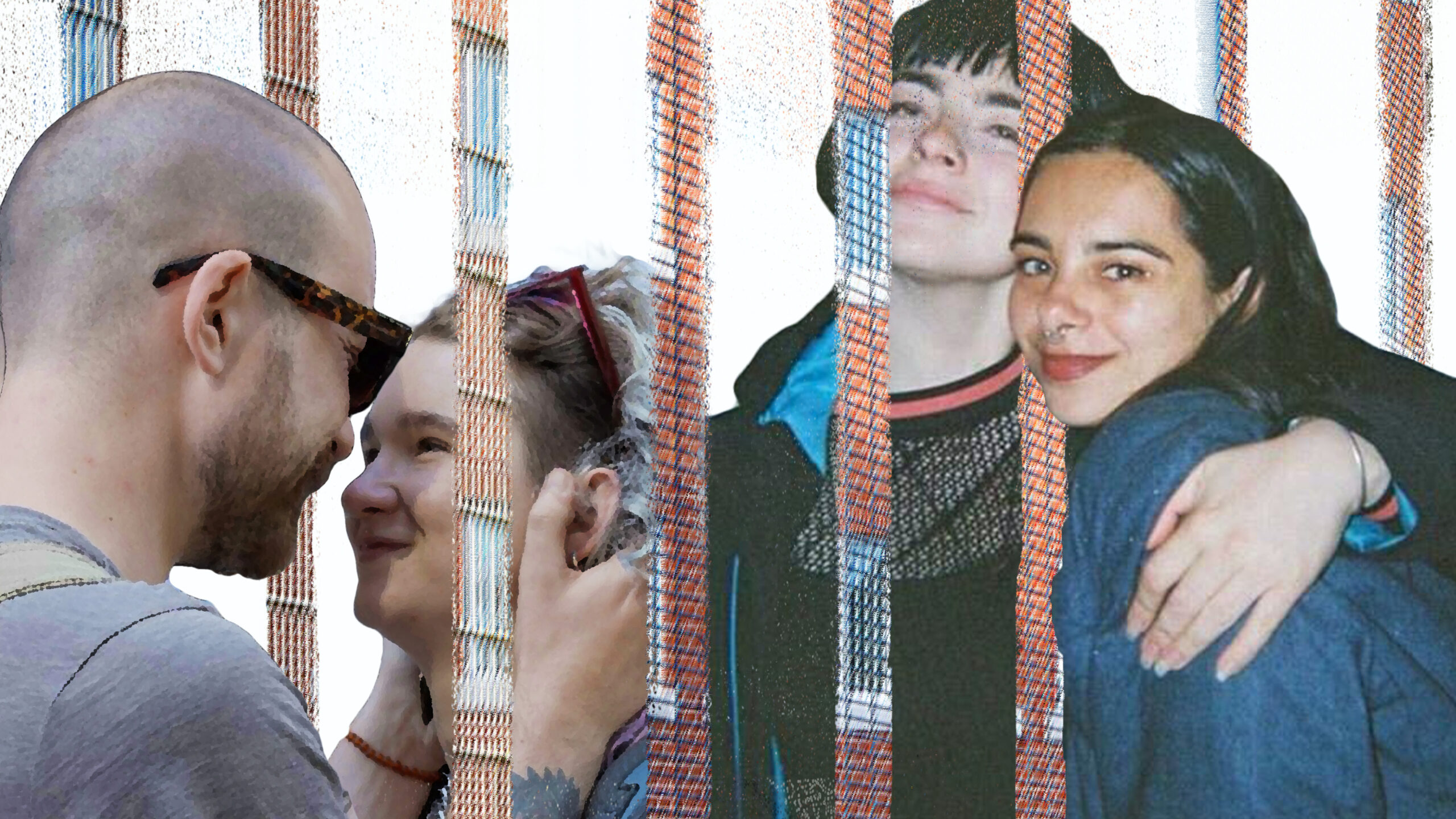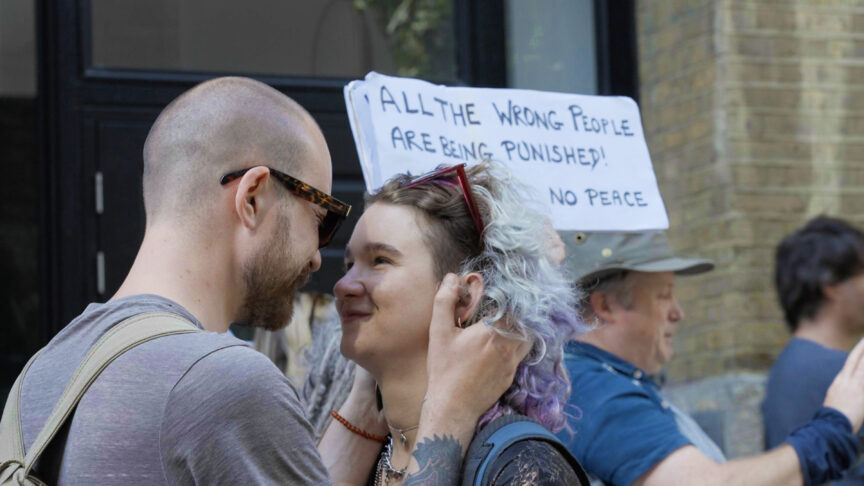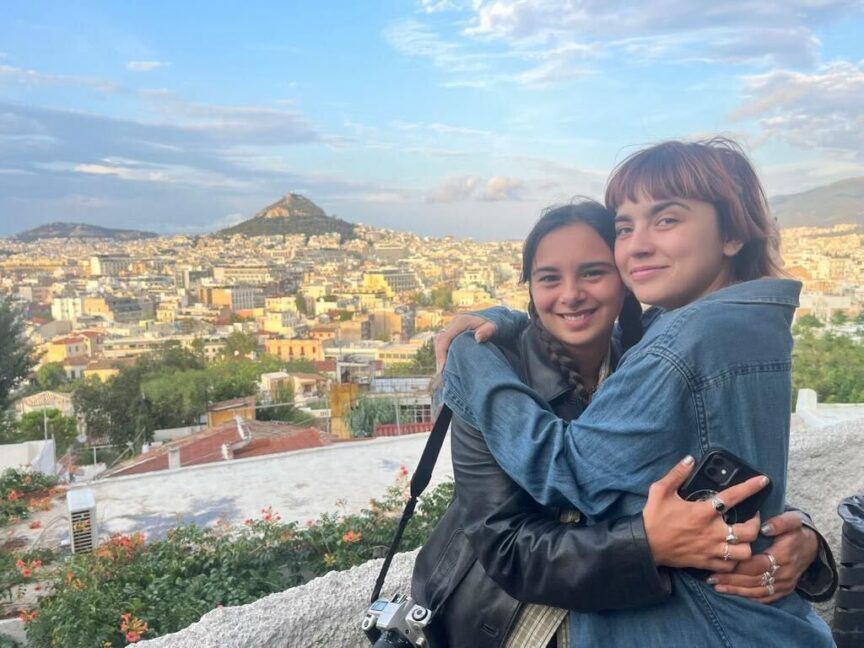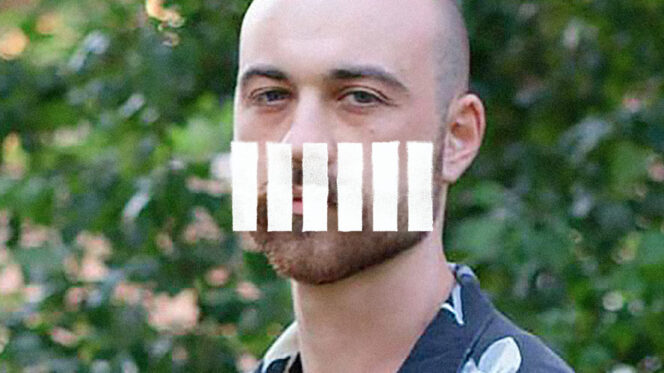What’s It Like to Love a Political Prisoner?
‘I’m not going to sit in limbo forever.’
by Clare Hymer
2 May 2025

Billionaire-backed? Not us. Unlike mainstream media, Novara Media runs on the support of 12,000 people like you, which keeps us editorially independent. Help power it and support independent media today.
The room at Isleworth Crown Court falls silent as the jury files back in. In the dock: eight Just Stop Oil activists, arrested following an action at Heathrow airport last summer.
I’ve got my eye on two defendants in particular. Luke Elson and Rosa Hicks have already spent over a year on remand between them. If convicted of conspiring to cause a public nuisance, they each face up to ten years in prison.
The jury foreman reads out the verdicts. One by one, all eight are found guilty.
Luke and Rosa stand rigid, eyes fixed straight ahead. They’re both professionals, and these verdicts weren’t totally unexpected. But behind their blank expressions, calculations are already running: sentencing possibilities, how much time they’ve already served, how many months – or years – before freedom.
In the public gallery, friends and supporters clutch each other’s hands. Some sob openly, despite Judge Duncan’s earlier calls for restraint when the verdicts came through.
Phoebe Plummer sits amongst them. Phoebe is one of Just Stop Oil’s most recognisable activists, famous for throwing soup at Van Gogh’s Sunflowers in 2022. They’re also Luke’s partner. Unlike others, they don’t cry.
Phoebe was released from prison just three weeks ago, and this courtroom, with its small windows and stifling protocols, was where they first saw Luke after seven months apart. On their first day at the trial, they’d gone over to the dock and – despite knowing the rules – stuck their fingers through a gap in the glass panels to try to touch him. The Serco guard, Phoebe tells me, wasn’t happy about it.
Rosa’s partner, Angel Rohan, isn’t in the courtroom today. Nor has she been on any day of the trial, in fact: she lives 9,000 miles away, in Western Australia. Rosa was building a life there with her, but the pull of Just Stop Oil brought her back to Britain. Rosa’s time in prison on remand has already strained their relationship. Now she’s been found guilty, their future together is in jeopardy.
“All rise,” says the usher. Everyone stands as the judge exits. Luke turns towards Phoebe, mouthing “I love you” before the guard leads him away.
An hour later on the platform at Isleworth train station, Phoebe is composed, seemingly unfazed by the morning’s events. “I never cry,” they tell me with a shrug. “So that bit was easy.”
But as we talk, it becomes clear the situation isn’t uncomplicated for Phoebe.
“I don’t think anybody [in Just Stop Oil] goes into a trial expecting to be found not guilty. There’s an element of being at peace with that for the part of me that’s a person in resistance,” they explain. “But then there’s also the part of my brain that’s like, ‘That’s the person I love. He’s just been found guilty.’
“In many ways, I think it’s harder when your partner goes to prison than being in prison yourself.”
Luke, Phoebe, Rosa and Angel are people whose relationships reveal the personal cost of political commitment that rarely makes headlines. Over the last five months, reporter Rivkah Brown and I have been getting to know these people for our new podcast series, Committed. We wanted to find out: how does it feel when your partner gets locked up for activism? How do you maintain your relationship when one or both of you is in prison? And, for those whose lives aren’t so defined by political struggle, how does it feel when your partner chooses a life of resistance over a life with you?
Phoebe and Luke.
Phoebe and Luke never really had a normal relationship. “I think I could probably count the number of dates Luke and I have had in nearly two years on one hand,” Phoebe told me the following week via Zoom. “We’ve never gone out for a meal.”
Just Stop Oil wasn’t just the backdrop to their romance – it was its foundation. Their first kiss was at a Just Stop Oil fundraiser with a free bar (“We were both a bit pissed,” Phoebe said).
Romance wasn’t something either of them had had on the cards. “I couldn’t quite believe it had happened, to be honest,” said Luke. “I was kind of taken off guard.”
After that, they’d mostly see each other at meetings and socials, where they’d spend all of their time together. Not long into their relationship, following a slow march in Parliament Square, they got arrested together – holding hands.
Luke and Phoebe’s experience isn’t particularly unique within Just Stop Oil. Many activists say that shared political commitment accelerates intimacy between people in the group, in romantic ways and not.
“The intensity of what we do, having those shared experiences – almost anybody you meet doing this, you have a bit of an instant connection with,” said Phoebe. “I think that’s maybe part of why I fell for Luke quite quickly, other than him being, you know, intensely lovable, is that you’re not starting from scratch. There’s already this bond there.”
The bond, however, came with unspoken understandings. That resistance comes first – “quite a brutal thing to say to the person you love,” Phoebe acknowledged. And that in a context of a government crackdown on protest, prison was likely in their future.
Phoebe had already been to prison when they met Luke. “Since the first time I went, I’ve lived my life going, ‘Yeah, of course I’m going to end up in prison again’ – it’s the upshot of taking effective action at this point,” they said. “I guess I’ve seen Luke go on the journey, too.”
When Luke signed up for the Heathrow 10 action, he knew it was likely he’d get remanded for it. The day before going to the safe house before the action, Phoebe was in court for the soup trial. Luke came to their trial, and then the two said goodbye outside the courthouse.
“None of the emotions had really sunk in until we were sitting opposite each other on this pathetic little patch of grass in central London, and it hit me that I just wasn’t going to see him – the person I love so much – and I had no idea how long for,” Phoebe said.

Until recently, Phoebe and Luke were both in prison. Phoebe said that in some ways, this is easier than when just one of them is behind bars, as it’s not like one of them is continuing to live their life without the other.
But there’s a lot more that’s difficult. They can’t visit each other, obviously. Neither can one of them just pick up the phone. Communication has to happen the old-fashioned way: by letter, often multiple times a week. Luke also sends Phoebe drawings which they stick up on their cell wall with toothpaste (“Something you’ll never learn until you’re in prison is that toothpaste makes excellent blue tack”, Phoebe said).
For Luke, the challenges of his relationship with Phoebe are all worth it. “It’s hard, but it’s okay,” he said. “And if I didn’t get into resistance, I would never have met them [Phoebe] in the first place.”
Phoebe agreed – and is adamant that their relationship fuels their political commitment rather than distracts from it.
“I think anyone could come up with 101 good reasons why they shouldn’t go to prison, and love will always be one of them,” they said. “But in order to be in resistance, in order to be resilient enough to deal with all of the uncertainty and anxiety and difficult shit it brings into our lives, you need to have love, and you need to have stability, and you need to have care. And being in a relationship with Luke gives me all those things.”
At the same time, being out of prison without him has made Phoebe realise just how hard it is on those who love Just Stop Oil activists. Phoebe misses him, and they’ve been worrying about him – and from the outside, there’s very little they can do to make sure he’s okay.
“It’s definitely been a wake up call for how different it feels to be the one on the outside,” they said. “I think I knew beforehand that it’s difficult for our loved ones when we go to prison, but it’s different to be kind of, like, viscerally experiencing that myself.
“I actually think it wouldn’t be a fair thing to put someone through who isn’t involved in civil resistance – saying, ‘Hey, I‘m going to go to prison. I have no idea how long for, I love you so I’d quite like you to still be my partner, but you’re going to come on this massive uncertainty with me and I’m not going to be around to kind of build a life with you’.
“It’s a hell of a thing for a partner to go through. And I wouldn’t want to put somebody I loved through that.”
Angel and Rosa.
Rosa moved to Australia in 2017 for a study abroad programme. By this point, she’d already done a bit of climate activism in Britain. But it was in Australia, seeing wildfires and droughts up close, that she decided she was going to make it her life.
Rosa returned to Britain the following year to finish her degree and immersed herself in the scene here. The Extinction Rebellion protests of 2019 were a big moment for her. But as soon as she was done studying, it was back to Australia. Then the pandemic hit, and she decided to stay put. That’s when she met Angel.
Unlike Luke and Phoebe, Rosa didn’t meet Angel in a political context, but at a house party. It was a while after that before the two hit it off. But eventually they became friends, then more than friends.
Angel always knew that climate activism was a big part of Rosa’s life. That was something she loved about her. “She’s just so, like, solid in her convictions,” Angel told me over Zoom in December. “It eases the people around her into lifting themselves to a higher standard.”
The world of resistance isn’t alien to Angel. She’s also an activist, campaigning around the rights of young people in Australian detention centres. But she’s not an activist in the same way as Rosa, Luke and Phoebe. “It’s not her whole life,” Rosa said.
In 2022, Rosa and Angel got engaged. They wanted to spend their lives together. But there was a problem: Rosa was feeling the need to move back to Britain. She wanted to be doing the kinds of direct action that risked arrest – “to lead by example and have proper integrity, as opposed to always working in the back”. But getting arrested and charged in Australia could have meant getting deported.
Rosa also didn’t want her relationship to hold her back. She’d seen how people’s love for their partners had stopped them from taking direct action, and she didn’t want to be one of them.
“The amount of times people would sign up for an action […] and then say, ‘Oh no, my husband doesn’t want me to do this’ and then step back,” she said. “I think that’s why beforehand, I was very much like, ‘No, I just need to focus on this.’”

At the start of 2023, Rosa made the difficult decision to leave Australia for Britain. She told Angel it was just for six months, and then she’d be back.
Angel understood – but she could see complications. In the time since Rosa had left Britain, the UK government had created new criminal offences for protest, in part in response to the tactics of Extinction Rebellion. Faced with this crackdown, prison was becoming ever more likely for activists.
“I knew it wasn’t true,” Angel said. “I kind of knew that if she went home, she was going to go to prison, just because of how the political climate was going over in England.”
That was exactly what happened. Rosa flew back to Britain and threw herself into Just Stop Oil. By the time the six months was up, she’d been arrested several times and had a number of upcoming court cases. Just Stop Oil also felt important to her, and she wasn’t ready to give it all up. By the summer of 2024, Rosa was on remand at HMP Bronzefield following an action at Heathrow – one, ironically, that she denies being involved in.
Prison only made Rosa and Angel’s already long-distance relationship harder. It took a long time before Angel was able to speak to Rosa on the phone (sorting out your prison call list can take a while). Plus, because of the seven-hour time difference, they were only able to call around once a week. And when they do, it’s only for 30 minutes to an hour.
“It’s always lovely to hear her voice, but I think we’re both [so] busy trying to catch each other up on what’s happening in life that I feel like we never get to have real discussions,” Angel said. “It’s definitely taken away some sort of depth and emotional intimacy.”
Angel wants Rosa to do what’s right for her. But it’s hard not knowing for how long she’s going to put activism above their relationship.
“I did say to her at some point […] that if she gets out, that she needs to come back straight away, or let go of what we have, because I’m not going to sit in the limbo forever,” she said.
“I don’t want it to be an ultimatum. I just want her to let go of whatever she’s holding on to. […] If she was like, actually, the best decision is for me to stay in England and continue doing this, obviously I’d be heartbroken, but I’d respect that […] But I feel like she’s living in two worlds. And it’s hard to support someone that’s, like, pulled between two entirely different things that they want.”
Over a series of phone calls with Rosa from Bronzefield, she told me how much she loves Angel, and how supportive Angel has been. The situation she’s put Angel in isn’t one she feels good about.
“Had she said, ‘No, I don’t want you to do that, I don’t want you to go’ […] then I think that would have been a real challenge,” Rosa said. “Because I think I would have just had to make a decision and would have gone. So yeah, I do feel guilty, because ultimately I have chosen this over her, and nobody wants to hear that.
“Obviously, I don’t want to hurt her. We have, ultimately, committed to wanting to spend our lives together, but at the same time there is something else which is so important […]. I feel really guilty that, yeah, she almost just has to […] wait for me and be fine about it.”
But Rosa might not have much of a choice about whether she goes back to Australia at all. She’s now out on bail, awaiting sentencing in mid-May. She’s also got upcoming trials next year.
Rosa told me that speaking to us for Committed has prompted her and Angel to have some conversations they’d perhaps been scared of having. She’s waiting until after her sentencing in mid-May before making any big decisions about the future of her relationship. But for now, despite everything, they’re in a good place.
“I’ve always not really been sure that I’ve believed in unconditional love,” Rosa said. “But the fact that Angel has been so amazing during my time in prison […], I’m like, ‘Oh man, […] I don’t really deserve this.’
But that doesn’t mean Angel’s not facing tough choices herself.
“I think I feel a lot of resistance […] to letting go, because she’s such a massive part of my life,” Angel told me.
“I think even if we [were to] throw away the romantic side […], she really is just like a best friend, and choosing to let go of a best friend when there’s been no falling out or anything – it’s a very hard decision.”
Additional reporting by Rivkah Brown.
Clare Hymer is head of articles at Novara Media.


